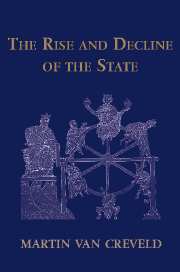Book contents
4 - The state as an ideal: 1789 to 1945
Published online by Cambridge University Press: 26 June 2009
Summary
The state as it emerged between about 1560 and 1648 was conceived not as an end but as a means only. During a period of intense religious and civil conflict, its overriding purpose was to guarantee life and property by imposing law and order; anything else – such as gaining the consent of the citizens and securing their rights – was considered secondary and had to wait until peace could be restored. This explains why, even in England with its relatively well-developed parliamentary tradition and even as late as Hobbes, the choice of the sovereign was irrevocable and liberty, as he put it, merely consisted of the cracks left between the laws which that sovereign enacted. True, neither Locke nor Montesquieu nor most of their eighteenth-century successors accepted Hobbes' conclusions in this respect; however, in regarding the state as a mere instrument for making a civilized people, they were entirely at one with him. As late as the 1790s Jeremy Bentham in Britain still considered the state in purely utilitarian terms as a machine whose only mission was to secure “the greatest happiness for the greatest number.” The prevailing attitude was succinctly explained by another Englishman, Alexander Pope: “for forms of government let fools contest/whatever is best administered is best.”
In view of these attitudes one should scarcely be surprised to find that the demands that the early modern state made on its subjects were, compared with what was to come later on, fairly limited.
- Type
- Chapter
- Information
- The Rise and Decline of the State , pp. 189 - 262Publisher: Cambridge University PressPrint publication year: 1999



